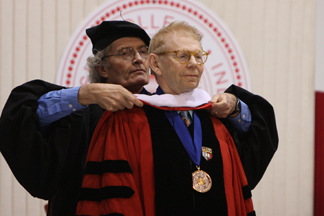William Robert “Bill” Cook ’66
Doctor of Humane Letters
May 16, 2010
William Robert Cook, consummate scholar of all things medieval, lover of art, music, and literature, and teacher without peer, Wabash honors you for your life well lived as a teacher and scholar and thanks you particularly for the many gifts you have shared with Wabash students, faculty, staff, and alumni as a member of our faculty the last two years — more than four decades after your graduation from the College.

You arrived here as an undergraduate in 1962 and quickly came under the intellectual spell of Professor Jack Charles — a fine mentor to a young man with broad interests and boundless energy. A member of Lambda Chi Alpha and the Glee Club, you were then, as you are now, known for your colorful wardrobe — so much so that David Kendall mentioned in his commencement address to graduating seniors that what made the day special was your overtly conservative tie! You would graduate
cum laude and Phi Beta Kappa from Wabash, earning a Woodrow Wilson Fellowship to pursue your Ph.D. in medieval history at Cornell University, where you also received the Herbert Lehman Fellowship.
The teachers during your years at Wabash — among them Jack Charles, Phil Wilder, Wendell Calkins, James Barnes, Ben Rogge, Dick Traina, and Bob Mitchum — prepared you well for an accomplished career as a college professor. In 1970, you joined the faculty of the State University of New York at Geneseo, where since 1984, you have held the title Distinguished Teaching Professor of History. Distinguished, indeed. You received the Chancellor’s Award for Excellence in Teaching at Geneseo, the C.A.S.E. Professor of the Year Award for the state of New York, the CARA Award for Excellence in Teaching from the Medieval Academy of America, and you were runner-up for the Robert Foster Cherry Award for Great Teaching.
You are today the foremost scholar of Saint Francis of Assisi, and you have written six books, including Images of St. Francis of Assisi and Francis of Assisi: The Way of Poverty and Humility. You are also widely published on Dante, The Song of Roland, and medieval monasticism; and you have appeared on The Learning Channel, The Hallmark Channel, and National Public Radio. And in every book, in every medium, you are always the consummate teacher, balancing enthusiasm and learning, clarity and passion.
Since your return to Wabash two years ago, you have taught courses in history, religion, philosophy, and Cultures and Traditions. You have taken our students on Immersion Learning experiences to Florence and across Tuscany. In fact, our students say that you are such a remarkable tour guide that you can guide them through museums entirely from memory — leading them through a crowded gallery with a headset microphone from outside the building. And in every step you honor your Wabash education. “When I take Wabash students abroad, I am giving back to my alma mater and honoring those who educated me,” you wrote after your Florence immersion last January.
Away from the Academy, you have been active in your community in politics and journalism. You are an advocate for children in foster care, international adoption, and for New York City’s Covenant House for abused and abandoned children. You are the proud father of three adopted sons, including Eric Huynh, Wabash class of 2007, and you have provided refuge and resources for at least another eight children.
Shaped by legendary Wabash professors, you have become one of the legends yourself. William R. Cook, you are a captivating teacher who embodies the liberal arts and who in every way lives out the Wabash mission to think critically, act responsibly, lead effectively, and live humanely. Through a lifelong pursuit of knowledge, new experiences, service, and the life of the mind, you have brought honor to your College through your words, wisdom, and actions. Therefore, by the authority vested in me by the Board of Trustees of Wabash College and delegated to that Board by the State of Indiana, I do hereby confer upon you the degree of Doctor of Humane Letters, honoris causa, with all the rights, privileges, and responsibilities thereunto appertaining, of which this citation shall be a permanent witness.
 You arrived here as an undergraduate in 1962 and quickly came under the intellectual spell of Professor Jack Charles — a fine mentor to a young man with broad interests and boundless energy. A member of Lambda Chi Alpha and the Glee Club, you were then, as you are now, known for your colorful wardrobe — so much so that David Kendall mentioned in his commencement address to graduating seniors that what made the day special was your overtly conservative tie! You would graduate cum laude and Phi Beta Kappa from Wabash, earning a Woodrow Wilson Fellowship to pursue your Ph.D. in medieval history at Cornell University, where you also received the Herbert Lehman Fellowship.
You arrived here as an undergraduate in 1962 and quickly came under the intellectual spell of Professor Jack Charles — a fine mentor to a young man with broad interests and boundless energy. A member of Lambda Chi Alpha and the Glee Club, you were then, as you are now, known for your colorful wardrobe — so much so that David Kendall mentioned in his commencement address to graduating seniors that what made the day special was your overtly conservative tie! You would graduate cum laude and Phi Beta Kappa from Wabash, earning a Woodrow Wilson Fellowship to pursue your Ph.D. in medieval history at Cornell University, where you also received the Herbert Lehman Fellowship.